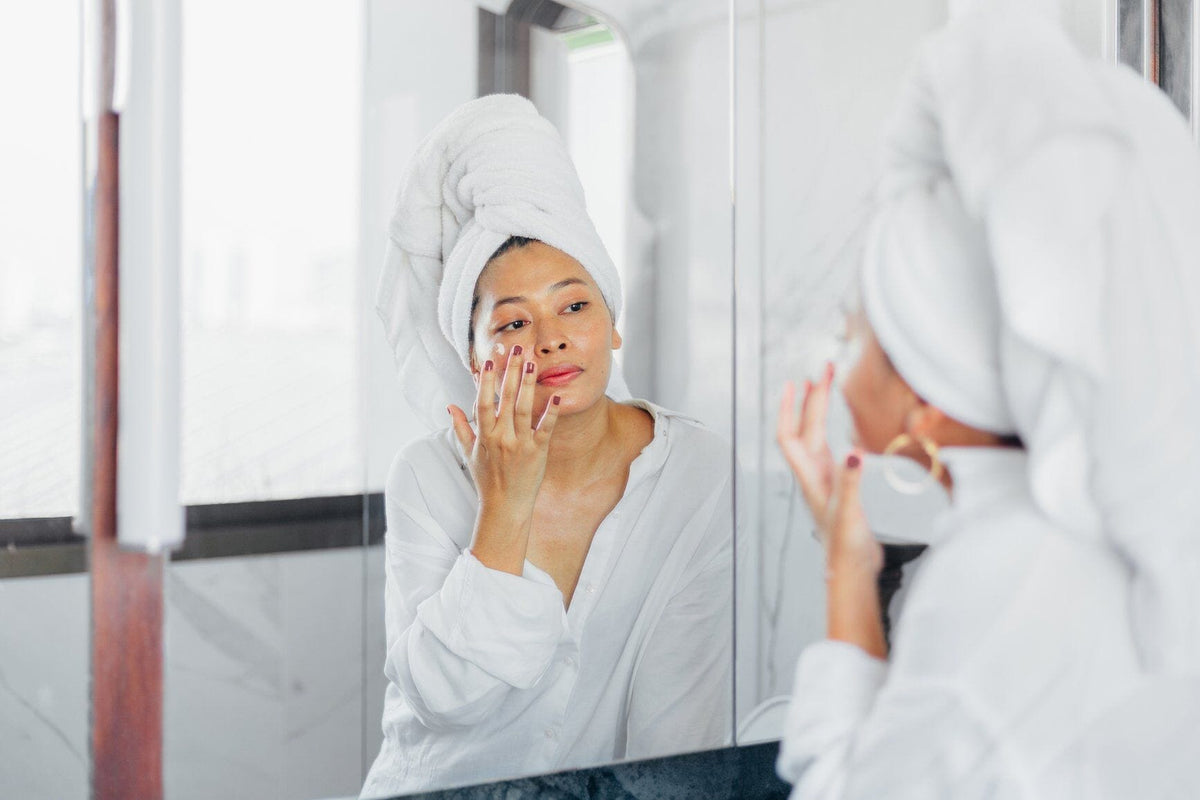Menopause hair and skin changes are sometimes unexpected, but they can be a natural part of the process of aging and are not unusual. Luckily, some of your most powerful tools to fight those age-related changes can be found in your fridge. Read on to learn more about some of the best nutrients for skin and hair for women in menopause.
Vitamins for Menopause Hair Loss and Skin Issues
To figure out the best vitamins for healthy skin and hair during menopause, it’s important to understand what’s behind those changes you’re experiencing—which tends to be age-related changes in estrogen, or lack thereof. This hormone does more than just control your menstrual cycle; it affects how your hair1 and skin2 look and feel. During menopause, your body naturally produces less and less of it, so your diet should contain specific vitamins that help to pick up the slack.
Vitamin A for Dry Hair and Skin
During menopause, dry skin can have even your thickest moisturizer struggling to make a difference. That’s because estrogen stimulates your production of oils that help your skin retain moisture—with less of them during menopause, itchy skin and dry spots can show up from head to toe.3
Your hair feels the effects too, since vitamin A is needed by the body to make sebum, a natural scalp conditioner. Get your vitamin A from animal products (like salmon and goat cheese) and orange and yellow vegetables (they’re high in beta-carotene, which makes vitamin A) like carrots and sweet potatoes.4
Vitamin C for Collagen Production
Estrogen stimulates collagen production, so age-related changes in estrogen levels can cause a natural decrease in collagen, showing up as more noticeable wrinkles, sagging skin, and even support for hair shafts.5 Help support and replenish this protein with vitamin C, which helps collagen production.6 You can get this helpful vitamin for skin and hair from citrus fruits, strawberries, peppers, and broccoli. Foods with vitamin C also help the absorption of iron in your diet, so pair them in a meal if you can.7
Healthy Fats for Moisturized Skin
Healthy fats, like omega-3 fatty acids, are fats that are good for supporting your healthy heart, maintaining already healthy cholesterol levels, aiding in overall health and wellness—and getting your glow back by nourishing and moisturizing your skin. Keeping your diet rich in omega-3 fatty acids is also important because your body can’t make omega-3 fatty acids on its own. You’ll find them in fish, nuts, seeds, and plant oils.8 You can also choose to supplement with fish oil if you prefer.
Importance of Protein for Skin and Hair Health
When it comes to menopause hair loss, sometimes you are what you eat—hair is made of protein strands, and deficiencies have been linked to hair shedding and brittleness.9 As your estrogen naturally declines, hair growth can also slow. Skin can take a hit too—your body turns the protein you eat into amino acids, some of which help exfoliate dead skin, make collagen, and protect against UV rays and free radicals. Fight menopause hair changes and skin changes with protein from animal products, legumes, nuts, seeds, and whole grains.10
Biotin for Healthy Hair
One of the best vitamins for menopause hair loss is biotin, aka vitamin B7, part of the vitamin B complex that helps our bodies convert food into energy. Biotin deficiency has been linked to hair loss and loss of hair color—one study found that 38% of women who said they had experienced hair loss were deficient in biotin. Get it into your diet through eggs (especially the yolk), nuts, legumes, whole grains, cauliflower, and mushrooms.11
Addressing Iron Deficiency for Hair Loss
Hair loss due to menopause can be quite common, as is perimenopause and thinning hair. Iron deficiency contributes to hair loss as it disrupts the nutrient supply to the hair follicle.12 This can lead to more hair shedding—potentially leaving you with overall thinning and even bald spots. To reduce menopause hair loss, you can prioritize keeping your iron levels up by eating meat, chicken, and fish, as well as lentils, spinach, and other leafy greens.13
For some additional quick tips on how to nourish your hair during menopause and beyond, check out this video from Bonafide Chief Medical Officer, Dr. Alyssa Dweck:
Resources
- https://www.ncbi.nlm.nih.gov/pmc/articles/PMC4828511/
- https://www.ncbi.nlm.nih.gov/pmc/articles/PMC2685269/
- https://health.clevelandclinic.org/heres-how-menopause-affects-your-skin-and-hair/
- https://www.healthline.com/nutrition/12-foods-for-healthy-skin#5.-Sweet-potatoes
- https://health.clevelandclinic.org/heres-how-menopause-affects-your-skin-and-hair/
- https://www.ncbi.nlm.nih.gov/pmc/articles/PMC5579659/
- https://www.nhs.uk/conditions/vitamins-and-minerals/vitamin-c/
- https://ods.od.nih.gov/factsheets/Omega3FattyAcids-Consumer/
- https://www.ncbi.nlm.nih.gov/pmc/articles/PMC4828511/
- https://health.clevelandclinic.org/your-guide-to-aging-hair/
- https://www.mountsinai.org/health-library/supplement/vitamin-h-biotin
- https://www.bbcgoodfood.com/howto/guide/what-eat-healthy-hair
- https://www.bbcgoodfood.com/howto/guide/what-eat-healthy-hair












Comments
Post commentGreat, helpful information.
Really interesting! It helped me understanding a little more about it,the product really works a lot….feeling and resting better then before.Thanks!
Thank you for the information
This information was very helpful. Please continue to provide valuable information like this. Thank you!